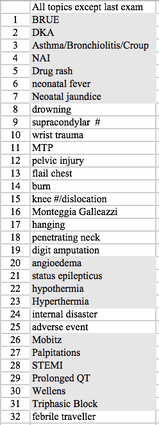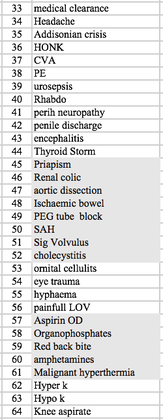What will be on the exam for the august sitting 2018?
Predicting an exam is always tricky, but not impossible.
If you can think like the examiners do, then its not that difficult, that is the main reason for writing questions.
My predictions for the last exam were quite successful and included: wrist trauma, non-accidental injury, organophosphate poisoning, hypo Na seizure , hypo K amongst others. When it comes to do the OSCE(www.OSCE.com.au), I was able to predict about half of the stations.
There are a few things that make prediction easier:
When trying to predict the exam I am making a calculated guess based on the exam matrix that I have.
Don't just study the lists I give. They are there for you to spend some extra time on.
I usually put 2 lists together: The 25 topics list and the major list, seen below.
HOW TO STUDY WITH 4 WEEKS TO GO
In the countdown leading up to the exam, this would be my preparation approach. You will have your own approach and that's fine, because you prepare in your own way. As long as you look at the list below and make sure you have reviewed these topics, it doesn't matter. Here is an approach:
4 WEEKS TO GO: Put a massive week plus a day or two into filling as many gaps as possible, concentrate on the big ticket items from your revision.
3 WEEKS TO GO: Look at the top 64 I have included below and ensure that these are part of the topics you have studied and have summaries of, as they seem to come up regularly.
2 WEEKS TO GO: Go over the top 25 I have included below and make sure that you know these. Now I can't guarantee they will come up, but I will say that quite a few of them will.
THE WEEK BEFORE THE EXAM: Go over your notes and think about how a question might be phrased. Think of drug dosages(but don't memorise endless infusion rates etc). Look at the admin questions and remember the general approach to all admin etc...
Remember what's important; ECGs, ABGs, X-rays, Paeds, Trauma will be there as will O&G.. all those things we have said. This final week is about getting everything systematised in your brain, so you can think of differentials.
The last exam was big on a descriptive stem and then asking for Differentials and then Management.
If you can't think of a differential have an approach as below:
Differentials list:
Then go get-em!
If you can think like the examiners do, then its not that difficult, that is the main reason for writing questions.
My predictions for the last exam were quite successful and included: wrist trauma, non-accidental injury, organophosphate poisoning, hypo Na seizure , hypo K amongst others. When it comes to do the OSCE(www.OSCE.com.au), I was able to predict about half of the stations.
There are a few things that make prediction easier:
- There are a limited set of topics that can be asked as an SAQ and they repeat
- Knowledge of how the repetition cycle works.
When trying to predict the exam I am making a calculated guess based on the exam matrix that I have.
Don't just study the lists I give. They are there for you to spend some extra time on.
I usually put 2 lists together: The 25 topics list and the major list, seen below.
HOW TO STUDY WITH 4 WEEKS TO GO
In the countdown leading up to the exam, this would be my preparation approach. You will have your own approach and that's fine, because you prepare in your own way. As long as you look at the list below and make sure you have reviewed these topics, it doesn't matter. Here is an approach:
4 WEEKS TO GO: Put a massive week plus a day or two into filling as many gaps as possible, concentrate on the big ticket items from your revision.
3 WEEKS TO GO: Look at the top 64 I have included below and ensure that these are part of the topics you have studied and have summaries of, as they seem to come up regularly.
2 WEEKS TO GO: Go over the top 25 I have included below and make sure that you know these. Now I can't guarantee they will come up, but I will say that quite a few of them will.
THE WEEK BEFORE THE EXAM: Go over your notes and think about how a question might be phrased. Think of drug dosages(but don't memorise endless infusion rates etc). Look at the admin questions and remember the general approach to all admin etc...
Remember what's important; ECGs, ABGs, X-rays, Paeds, Trauma will be there as will O&G.. all those things we have said. This final week is about getting everything systematised in your brain, so you can think of differentials.
The last exam was big on a descriptive stem and then asking for Differentials and then Management.
If you can't think of a differential have an approach as below:
Differentials list:
- Traumatic
- Inflammatory
- Neoplastic
- Vascular
- Infective
- Metabolic
Then go get-em!
25 Topics List
|
The list of 25 topics that I think will be on this exam:
1 Kid with a wheeze 2 BRUE 3 Paeds Seizure/Status Epilepticus 4 DKA 5 Burn 6 Pelvic fracture 7 Supracondylar fracture 8 Flail Chest 9 Penetrating Neck injury 10 Internal Disaster 11 Adverse event 12 Blocks 13 STEMI |
14 Hyper K 15 Thyroid Storm 16 Priapism 17 Ischaemic Bowel 18 Lower GI Bleed 19 Hyphaema 20 Painfull LOV- Glaucoma 21 Orbital Cellulitis 22 Pre-eclampsia 23 Serotonin syndrome 24 Hydrofluoric Acid Burns 25 Addisonian Crisis |
The Major List
This is a list of 60 or so topics that have been present in the last few exams and there is a high chance that they will repeat.

